|
|
|
Sort Order |
|
|
|
Items / Page
|
|
|
|
|
|
|
| Srl | Item |
| 1 |
ID:
165741
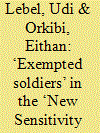

|
|
|
|
|
| Summary/Abstract |
In recent decades (the ‗post-heroic‘ condition) - threats of widespread selective conscientious objection have become a political tool to advance opposing political agendas in Israel. This article examines attitudes amongst the Israeli public concerning the legitimacy of demands that different groups of soldiers be exempted from military operations to which they are ideologically opposed (such as serving in the occupied territories or, conversely, participating in evacuation of settlements). The results point to a multi-cultural model embracing diversity management not as a neo-liberal ideal but rather as a strategy for co-option, containment and inclusion, with a view to preserving the “people's army” model.
|
|
|
|
|
|
|
|
|
|
|
|
|
|
|
|
| 2 |
ID:
182651
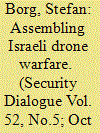

|
|
|
|
|
| Summary/Abstract |
This article examines how unmanned aerial vehicles (UAVs), or drones as they are more popularly known, have changed practices of Israeli warfare. In order to do so, the article proceeds in three steps. First, it traces the emergence and development of the Israeli UAV programme. Second, it examines the main factors that have enabled its expansion. Third, it turns to some of the main implications of UAVs for the way in which the Israeli Defence Force (IDF) wages war. The article argues that the combined tactical use of UAVs employed for intelligence, surveillance and reconnaissance (ISR) tasks has amounted to a strategic effect: by dramatically enhancing the field of perception, UAVs have enabled the IDF to better control the battle rhythm. UAVs in the Israeli context have enhanced the IDF’s operational sustainability, since one’s own casualties have been virtually eliminated and civilian casualties have been stretched out over, rather than concentrated in, time. Throughout the article, the changing character of the UAV is emphasized. To capture this change and to unravel the interactions among technology, warfare and broader societal forces, the article draws on actor-network theory.
|
|
|
|
|
|
|
|
|
|
|
|
|
|
|
|
| 3 |
ID:
173832
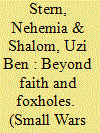

|
|
|
|
|
| Summary/Abstract |
This paper explores the vernacular roles that religious practices and experiences play within contemporary combat units of the Israel Defense Forces (IDF). We argue for an anthropological perspective that highlights the modes through which rituals serve efficacious – as opposed to semiotic – ends. In this way, we seek to push back against what we term the ‘faith in a foxhole’ paradigm, where religion is primarily seen as a meaning-making system whose nearly sole function is to aid soldiers in coping with the chaos and uncertainty of combat. We demonstrate how amidst the low-level and long-term style of contemporary asymmetrical warfare, ritual practices can often function less as the matrix for broader meaning making systems but are rather mobilized in ways that are meant to support certain practical and pragmatic goals. The article concludes that while scholars have mostly focused attention on the institutional forces and political consequences of ‘religionization’ within Israeli society, they have missed the many vernacular ways in which Israelis mobilize and instrumentalize their use of ritual and religious practices in both military and civilian contexts.
|
|
|
|
|
|
|
|
|
|
|
|
|
|
|
|
| 4 |
ID:
178299
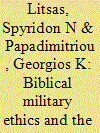

|
|
|
|
|
| Summary/Abstract |
The deployment of special forces in hostile or politically volatile environments in search of strategic/operational intelligence, though not a 21st century novelty, appeared as a distinct military activity in literature only in the early 2000s under the label ‘Special Reconnaissance’ (SR). This article argues that the concept of SR (a) originated in the biblical Israelite military tradition and is depicted in the Bible as the lapis angularis of military strategy and a practice capable of dictating military and political norms; (b) has been used as a key element of the Israel Defence Forces’ (IDF) modus operandi since 1948 thenceforth functioning in an analogous manner. To support these arguments, the theoretical and practical characteristics of Moses’ intelligence mission to Canaan as well as the IDF’s proclivity to SR are scrutinised under the general theoretical framework of political realism that assumes rational and pro-state interest course of actions. Accordingly, SR emerges as a distinctive common instrument of biblical and contemporary Israeli strategy, a fact that underlines the uninterrupted socio-political and cultural links between the past and the present of the Israeli ontology, this time via the wider concept of the Israeli military ethics.
|
|
|
|
|
|
|
|
|
|
|
|
|
|
|
|
| 5 |
ID:
171680
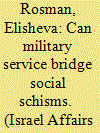

|
|
|
|
|
| Summary/Abstract |
Can the military bridge social schisms? Conventional wisdom supports this assumption. However, it seems that, at best, the effect of military service on bridging social schisms and promoting social cohesion is limited. This article examines the extended effect of contact hypothesis in the military, both in practice and as an element capable of bringing about a change in veterans’ thinking. It asks: are veterans who had diverse friendships during their service more likely to have diverse friendships in the future? If so, do they attribute their ability and willingness to include others within their ingroup to their military service? Based on findings from a study of Israeli college and university students, the article demonstrates that while indeed service friendships may be short lived, service alongside members of outgroups has certain longer-term effects and influences the social perception of veterans. Social messages can be both positive and negative and teach veterans the limits of redrawing social boundaries.
|
|
|
|
|
|
|
|
|
|
|
|
|
|
|
|
| 6 |
ID:
195242


|
|
|
|
|
| Summary/Abstract |
Military organizations have adapted to the logic and dynamics of social media to transmit their institutional narratives. Instagram is the most popular social network, but one of the most understudied in relation to the Armed Forces. This research note presents a comparative study of the content of the official accounts of the Spanish, French, the United States, Israeli, and Australian armies throughout 2021 (n = 1,922). The specific objectives are to describe and analyze the hashtags, the accounts mentioned, and the main topics of the post. Results show that armies can convey multiple messages in a single post, and reveal that armies make similar use of Instagram, notwithstanding the various differences between Israel and the other armies due to organizational and contextual elements.
|
|
|
|
|
|
|
|
|
|
|
|
|
|
|
|
| 7 |
ID:
178249
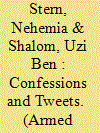

|
|
|
|
|
| Summary/Abstract |
This article explores the social media postings of Israel Defense Forces (IDF) soldiers on two different and unofficial Facebook groups. While scholars of armed forces and society have noted the growing importance that militaries have placed on digital media, there is little data regarding the unofficial uses and meanings that regular soldiers themselves make of social networking sites. With an anthropological focus on everyday experiences, we argue that the social media activity of IDF personnel highlights the quotidian aspects of military life in ways that reverberate beyond the strictly ideological or political facets of their service. Here, soldiers can express their frustrations with military bureaucracy, while also presenting a lighthearted (and positive) commentary on a shared rite of passage. This research opens a window into the lives and dilemmas of the first generation of Israeli soldiers to employ new media as a taken for granted aspect of their service.
|
|
|
|
|
|
|
|
|
|
|
|
|
|
|
|
| 8 |
ID:
103239
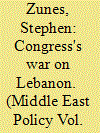

|
|
|
| 9 |
ID:
148250
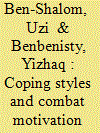

|
|
|
|
|
| Summary/Abstract |
The characteristic challenges of combat lead military personnel to develop adaptive coping styles that are different from coping styles used in routine life. This contention is explored using data collected from Israel Defense Forces conscript and reserve soldiers during intense military operations. The results of this study support this claim, in particular concerning faith. Coping styles were also correlated with combat motivations and measures of positive and negative emotions. It seems that a well-adapted soldier may use unique coping styles that, although perhaps not understood by outsiders, can contribute to his capacity to carry out his undertakings. A better understanding of such a state of mind should prove valuable for military leaders and religious experts.
|
|
|
|
|
|
|
|
|
|
|
|
|
|
|
|
| 10 |
ID:
181963
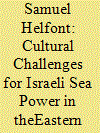

|
|
|
|
|
| Summary/Abstract |
The strategic-military significance of the recent discovery of extensive natural gas fields in the eastern Mediterranean works against Israel’s traditional reluctance to become a sea power. But any “turn to the sea” will require adopting a broad national and strategic mind-set in the face of cultural constraints that keep Israel tied to the land.
|
|
|
|
|
|
|
|
|
|
|
|
|
|
|
|
| 11 |
ID:
128052
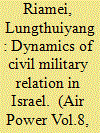

|
|
|
|
|
| Publication |
2013.
|
| Summary/Abstract |
Israel was founded in 1948 in the midst of war and hardship, a period personified by the brave men and women driven by a sense of historic mission to risk everything to protect Jewish lives from assault and military attack. The generation that fought for a Jewish state also had to structure government activities that demand a different kind of boldness in a context tested not by first power but by competing interest goals. Since the creation of the state of Israel, the Jewish population has been defined by military Service. The Israeli citizen was ultimately there to serve in its war against the Arab world, Despite recurrent wars and a perpetual state of alert, Israel has profoundly failed to become a military state. Israel is the only post-World War II democracy in the world that has been in a state of constant war with its neighbours.
|
|
|
|
|
|
|
|
|
|
|
|
|
|
|
|
| 12 |
ID:
126725
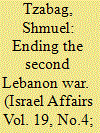

|
|
|
|
|
| Publication |
2013.
|
| Summary/Abstract |
The termination of the Second Lebanon War (2006) is among the most unusual in wars between Israel and Arab states. A classic example of an asymmetrical confrontation between a sovereign state and a guerrilla organization controlling part of a neighbouring state and operating against its will by means of terrorism, the war had far-reaching ramifications for Israeli decision makers in terms of defining the enemy and setting the termination goals of the conflict. In this respect great significance is attributed to the influence of the interface between the military and political echelons on formulating the war's termination strategy, especially in light of the high status enjoyed by the military in Israeli democracy.
|
|
|
|
|
|
|
|
|
|
|
|
|
|
|
|
| 13 |
ID:
131976
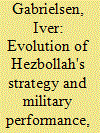

|
|
|
|
|
| Publication |
2014.
|
| Summary/Abstract |
This article fills a gap in the research on Hezbollah by evaluating their military performance from their formation in 1982 and up till the 2006 Israel-Hezbollah War. This study tests the theses that Hezbollah had developed a very strong tactical proficiency in the late 1990s and that there are more similarities in their strategy and tactics during the 2006 war and the 1982-2000 insurgency in Southern Lebanon than previously assumed. Another central theme of this article is how Hezbollah has been constantly adapting and evolving for the duration of its existence.
|
|
|
|
|
|
|
|
|
|
|
|
|
|
|
|
| 14 |
ID:
098368
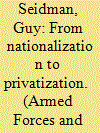

|
|
|
|
|
| Publication |
2010.
|
| Summary/Abstract |
In recent years the use of private military contractors to execute national security tasks in the U.S. military has finally come under public scrutiny. The main policy question is in three parts: What is the proper division of labor between the public and private sectors? Who decides which sector performs a specific task? If private operatives perform tasks that typically fall on the public side (combat, interrogation), what is the public oversight over the private actors, and how can they be held accountable for wrongdoings? In this article these questions are addressed in relation to the privatization process in the Israeli Defense Forces (IDF). The article has four parts: the first suggests that the Israeli baseline is unique as the IDF has historically been entrusted with a wide array of national-civilian missions; the second explains the economic realities that probably lie behind the privatization efforts; the third describes the slow and cautious privatization process currently under way; the fourth suggests that while there is little public debate, there is civilian oversight, there are some publicly exposed rationales, and there is public support in letting the IDF, the most trusted part of the executive branch, control the process.
|
|
|
|
|
|
|
|
|
|
|
|
|
|
|
|
| 15 |
ID:
190454
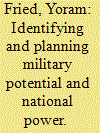

|
|
|
|
|
| Summary/Abstract |
Research on the military potential/national power has focused on features such as numbers of soldiers, the military budget, population size, industrial production, technology, and others as underlying national power. The geopolitical situation of the State of Israel made the IDF General Staff the arbiter of any planning decision related to the development of the state economy, and responsible for planning and directing national security. Because the asymmetry between the military potential of the Arab countries and that of Israel was a reality on the ground that Israel’s national security concept had to take into consideration, and because modern warfare is between nations, their material forces and their mental capacities, the Israel Defence Forces [IDF] recommended setting up civil–military Planning Units based on military guidelines to identify, calculate and plan specific areas of national potential such as administration and regime, morale and education, static defence, the economy in wartime, and manpower.
|
|
|
|
|
|
|
|
|
|
|
|
|
|
|
|
| 16 |
ID:
099554
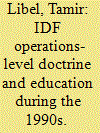

|
|
|
| 17 |
ID:
129372
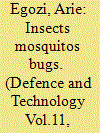

|
|
|
|
|
| Publication |
2012.
|
| Summary/Abstract |
The face of warfare has changed. Kilometers long tank columns and thousands of troops marching forward are scenery from the past. Today's battlefield is an urban terrain swarming with small groups of irregular forces that rapidly switch positions from hindouts to tunnels.
|
|
|
|
|
|
|
|
|
|
|
|
|
|
|
|
| 18 |
ID:
109952
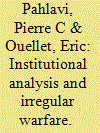

|
|
|
|
|
| Publication |
2012.
|
| Summary/Abstract |
The new attention paid to 'small wars' does not seem to translate into a better adaptation of conventional armed forces to this type of conflicts. As illustrated by the IDF's inability to get a decisive edge against the Hezbollah during the 33-Day War, Israel is no exception to such difficulty to adapt. A number of analysts have concluded that, victim of its long experience gained through the Intifadas, Israel 'over-adapted' to irregular warfare. Applying a sociological framework inspired by the seminal work of Richard Scott, this study suggests that this view is, at best, arguable. Going beyond the classical military explanations by uncovering key sociopolitical forces that have shaped the Israeli defense institutions, this study proposes that the combination of a post-heroic society and unbalanced civil-military relations have led the Israeli military institution to opt for a conventional posture articulated around technocentric tenets, which are ultimately disregarding the true nature of the asymmetrical challenge presented by the Hezbollah.
|
|
|
|
|
|
|
|
|
|
|
|
|
|
|
|
| 19 |
ID:
160945
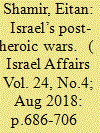

|
|
|
|
|
| Summary/Abstract |
This article examines the role of American military influence on Israel’s transition to post-heroic warfare. The main factors identified in the existing literature that have been identified to explain Israel’s transition to post-heroic warfare had to do with the changes in Israel’s strategic environment, changes in society and development of new military technology. This article sheds light on an intervening factor that further enables and shapes the transition to post-heroic war; the American military influence over the Israel Defence Forces. The strategic uncertainty and lack of professional direction encouraged Israel’s military establishment to turn to American military ideas. The US military is perceived by the IDF as a leading professional institution that is dealing with similar challenges and operating under similar constraints.
|
|
|
|
|
|
|
|
|
|
|
|
|
|
|
|
| 20 |
ID:
183987
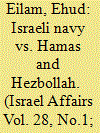

|
|
|
|
|
| Summary/Abstract |
The Israeli navy prepares to confront Arab non-state actors, mostly Hamas and Hezbollah. Hezbollah might attack Israel’s sea lanes in the Mediterranean Sea, while both Hamas and Hezbollah might strike Israel’s natural gas rigs and the Israeli coastline, where most of the Jewish state’s population and infrastructure are located. The Israeli navy will support ground forces by gathering intelligence and by striking targets. Yet, the Israeli navy does not have significant firepower so the IAF will assist in this matter. The Israeli navy also lacks the ability to conduct vast amphibious operations. The IDF can invest in this field sicne such a maneuver can be a game changer.
|
|
|
|
|
|
|
|
|
|
|
|
|
|
|
|
|
|
|
|
|